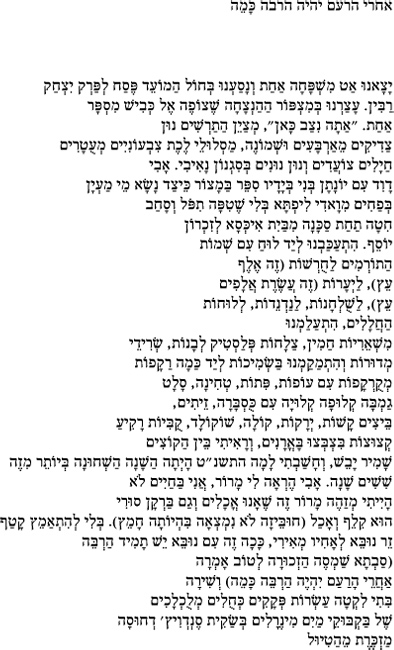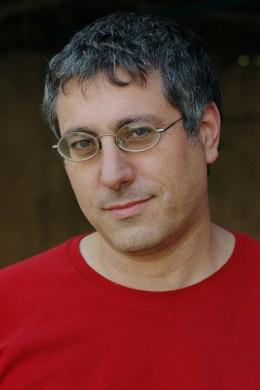Gilad Meiri
AFTER THUNDER, MANY TRUFFLES
We set out slowly, a family on Passover vacation,
driving to Rabin Park. We stopped at the memorial
lookout over Route One. “You are here”
says the diagram with reference points from 1948,
colorful walking paths decorated with marching soldiers,
command cars in naive style. My father David
with my son Jonathan in his arms
told how he carried well water during the siege,
from the Lifta Gorge in jerry cans without spilling a drop,
and smuggled flour under fire, from Beit Iksa to Zikhron Yosef.
We paused at the plaque with names
of donors for groves (a thousand
trees), for forests (twenty thousand
trees), for tables, swings, slabs
bearing names of the dead and we ignored
leftover stew, white plastic plates and the remains
of bonfires and we settled on blankets near a few scalped
cyclamen and started on chicken, pita, sesame paste,
a salad of peeled and roasted red peppers with cilantro, olives,
hard-boiled eggs, vegetables, cola, chocolate, squares
of chopped sky peeking through the pines, I saw dill shrivelled
among the thorny weeds and wondered why this year was the driest
in sixty. My father showed me bitter herbs we eat on this night
that I would never recognize on my own, and Syrian thistles
he trimmed and ate, but not the mallow leaves –
which we didn’t, because they’re forbidden
at Passover. Without even trying he gathered
a bouquet of arum for his brother, that’s how it is
with arum, there’s always so much,
my grandmother Shamseh of fond memory used to say,
“After thunder, many truffles,” and my daughter Shira
picked dozens of dirty blue caps
of mineral water bottles
that she crammed into a sandwich bag
a souvenir from the trip
אחרי הרעם יהיה הרבה כָּמֵה
אחרי הרעם יהיה הרבה כָּמֵה

From: Organic Paganic
Publisher: Carmel, Jerusalem
AFTER THUNDER, MANY TRUFFLES
We set out slowly, a family on Passover vacation,
driving to Rabin Park. We stopped at the memorial
lookout over Route One. “You are here”
says the diagram with reference points from 1948,
colorful walking paths decorated with marching soldiers,
command cars in naive style. My father David
with my son Jonathan in his arms
told how he carried well water during the siege,
from the Lifta Gorge in jerry cans without spilling a drop,
and smuggled flour under fire, from Beit Iksa to Zikhron Yosef.
We paused at the plaque with names
of donors for groves (a thousand
trees), for forests (twenty thousand
trees), for tables, swings, slabs
bearing names of the dead and we ignored
leftover stew, white plastic plates and the remains
of bonfires and we settled on blankets near a few scalped
cyclamen and started on chicken, pita, sesame paste,
a salad of peeled and roasted red peppers with cilantro, olives,
hard-boiled eggs, vegetables, cola, chocolate, squares
of chopped sky peeking through the pines, I saw dill shrivelled
among the thorny weeds and wondered why this year was the driest
in sixty. My father showed me bitter herbs we eat on this night
that I would never recognize on my own, and Syrian thistles
he trimmed and ate, but not the mallow leaves –
which we didn’t, because they’re forbidden
at Passover. Without even trying he gathered
a bouquet of arum for his brother, that’s how it is
with arum, there’s always so much,
my grandmother Shamseh of fond memory used to say,
“After thunder, many truffles,” and my daughter Shira
picked dozens of dirty blue caps
of mineral water bottles
that she crammed into a sandwich bag
a souvenir from the trip
From: Organic Paganic
AFTER THUNDER, MANY TRUFFLES
We set out slowly, a family on Passover vacation,
driving to Rabin Park. We stopped at the memorial
lookout over Route One. “You are here”
says the diagram with reference points from 1948,
colorful walking paths decorated with marching soldiers,
command cars in naive style. My father David
with my son Jonathan in his arms
told how he carried well water during the siege,
from the Lifta Gorge in jerry cans without spilling a drop,
and smuggled flour under fire, from Beit Iksa to Zikhron Yosef.
We paused at the plaque with names
of donors for groves (a thousand
trees), for forests (twenty thousand
trees), for tables, swings, slabs
bearing names of the dead and we ignored
leftover stew, white plastic plates and the remains
of bonfires and we settled on blankets near a few scalped
cyclamen and started on chicken, pita, sesame paste,
a salad of peeled and roasted red peppers with cilantro, olives,
hard-boiled eggs, vegetables, cola, chocolate, squares
of chopped sky peeking through the pines, I saw dill shrivelled
among the thorny weeds and wondered why this year was the driest
in sixty. My father showed me bitter herbs we eat on this night
that I would never recognize on my own, and Syrian thistles
he trimmed and ate, but not the mallow leaves –
which we didn’t, because they’re forbidden
at Passover. Without even trying he gathered
a bouquet of arum for his brother, that’s how it is
with arum, there’s always so much,
my grandmother Shamseh of fond memory used to say,
“After thunder, many truffles,” and my daughter Shira
picked dozens of dirty blue caps
of mineral water bottles
that she crammed into a sandwich bag
a souvenir from the trip
Sponsors

























